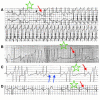Genetics of acquired long QT syndrome
- PMID: 16075043
- PMCID: PMC1180553
- DOI: 10.1172/JCI25539
Genetics of acquired long QT syndrome
Abstract
The QT interval is the electrocardiographic manifestation of ventricular repolarization, is variable under physiologic conditions, and is measurably prolonged by many drugs. Rarely, however, individuals with normal base-line intervals may display exaggerated QT interval prolongation, and the potentially fatal polymorphic ventricular tachycardia torsade de pointes, with drugs or other environmental stressors such as heart block or heart failure. This review summarizes the molecular and cellular mechanisms underlying this acquired or drug-induced form of long QT syndrome, describes approaches to the analysis of a role for DNA variants in the mediation of individual susceptibility, and proposes that these concepts may be generalizable to common acquired arrhythmias.
Figures





References
-
- Viskin S, Justo D, Halkin A, Zeltser D. Long QT syndrome caused by noncardiac drugs. Prog. Cardiovasc. Dis. 2003;45:415–427. - PubMed
-
- Roden DM. Drug-induced prolongation of the QT Interval. N. Engl. J. Med. 2004;350:1013–1022. - PubMed
-
- Dessertenne F. La tachycardie ventriculaire à deux foyers opposés variables. Arch. Mal. Coeur Vaiss. 1966;59:263–272. - PubMed
-
- Halkin A, et al. Pause-dependent torsade de pointes following acute myocardial infarction. A variant of the acquired long QT syndrome. J. Am. Coll. Cardiol. 2001;38:1168–1174. - PubMed
-
- Schwartz PJ, Wolf S. QT interval prolongation as a predictor of sudden death in patients with myocardial infarction. Circulation. 1978;56:1074–1077. - PubMed
Publication types
MeSH terms
Substances
Grants and funding
LinkOut - more resources
Full Text Sources
Other Literature Sources

